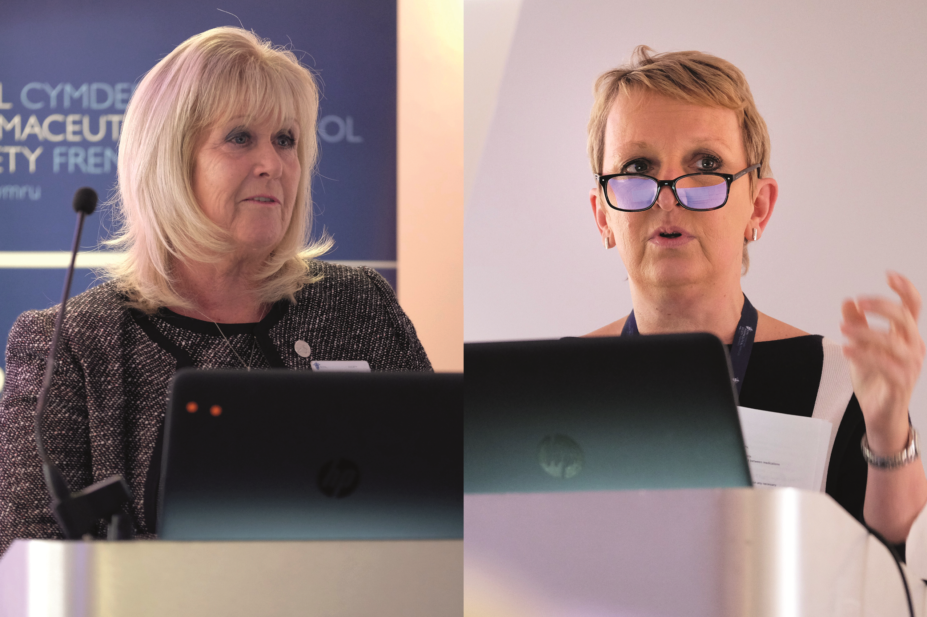
Nick Treharne
On 3 November 2016, Royal Pharmaceutical Society (RPS) Wales held its 6th medicines safety conference under the theme of “shifting care – breaking the cycle”. The conference programme featured a variety of speakers, from Don Berwick, former president emeritus and senior fellow at the Institute for Healthcare Improvement (IHI), to Vaughan Gething, the Welsh cabinet secretary for health, well-being and sport.
The talks focused on delivering care closer to people’s homes, away from hospital and into the community setting. The conference also saw the launch of the RPS policy on long-term conditions, which was presented by Mair Davies, director for RPS Wales and Judith Vincent, chair of the All-Wales Chief Pharmacists Committee.
The morning chair was John Palmer, director of primary, community and mental health services at Cwm Taf University Health Board, who set the theme for the day by asking everyone in the room to stand and hold hands — highlighting that healthcare sectors need to work together in order to achieve change. “The only way you get best practice to move fast is to hold hands — we’ve got to make things stick and make things stick at scale. It’s not just about Wales, it’s about how we should do it across the UK, across Europe and across the world.”
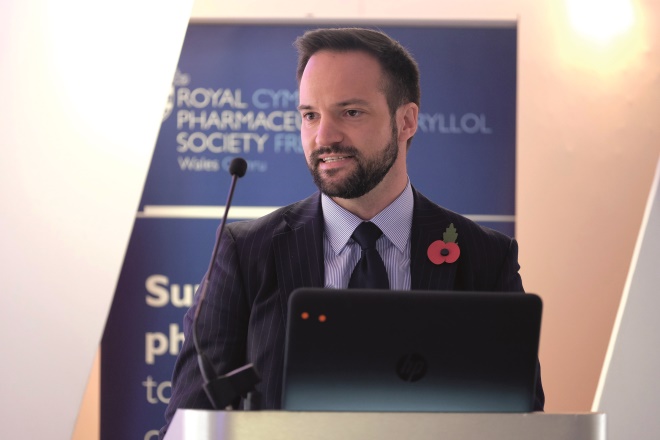
Source: Nick Treharne
“The only way you get best practice to move fast is to hold hands – we’ve got to make things stick and make things stick at scale,” said morning chair John Palmer, director of primary, community and mental health services at Cwm Taf University Health Board
Don Berwick, who pre-recorded a video message for conference delegates, highlighted that the theme of shifting care and resources “could not be more apt”.
“We know what we want. We want the kind of care for all of our neighbours that we want for ourselves,” he said, adding that the IHI define this “kind of care” as being “about safe, effective, patient centred, timely, efficient and equitable care”.
Berwick explained that the IHI agenda is currently focused on the triple aim of better care, better health and lower cost. In order to achieve this, Berwick stressed that an understanding of the science that underlies the improvement of any system is required: “We need to understand how things get better…you can’t ask an existing system to do better…change is the key to improvement.”
Berwick’s message was followed by a talk by Chris Ham, chief executive of the King’s Fund, who spoke about transforming delivery of healthcare by bringing care close to home. “We need to shift where and how care is delivered, more care outside hospital, care closer to home. The overriding priority is much greater integration of care around people and around populations,” he said. Ham used fictional patient stories to demonstrate how vital joined up care is for people moving around the healthcare system. Ham explained how we need to get rid of the old view that hospitals are islands and instead look at them as “population health systems” where the hospital door is not a barrier to specialists but an opening by which they can become more integrated into the community setting. He used the example of New Zealand, where, despite the 2011 Christchurch earthquake taking out the hospital capacity, the healthcare services were still able to cope due to their work around integrated care. According to Ham, change requires a long-term commitment with reforms coming from within the NHS not outside it.
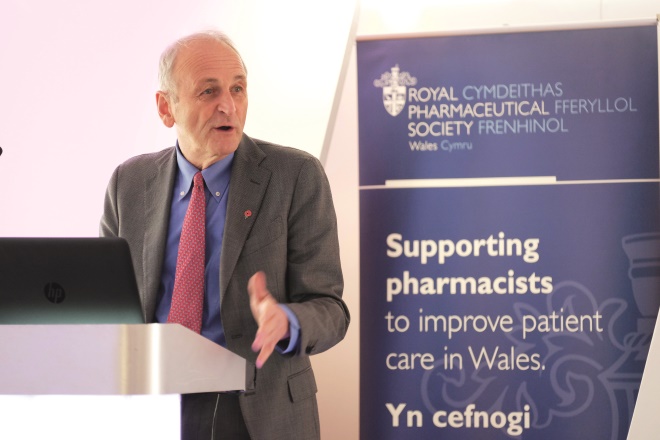
Source: Nick Treharne
Chris Ham, chief executive of the King’s Fund, spoke about transforming delivery of healthcare by bringing care close to home
With prescribing rates in Wales rising faster than in England, Robert Royce from A Regional Collaboration for Health (ARCH) in south west Wales, asked whether Wales is a drug-dependent nation. He explained that international compliance rates for long-term medication therapies are between 40% and 50%. “This represents a safety problem; a waste of resources; and a problem in terms of outcomes,” he said. “We need to be more assertive in changing clinical practice and prescribing of low effectiveness. We need to have more focus on the evidence base and the outcome utility of what we do.”
According to Royce, ARCH, which is a collaboration between two health boards and Swansea University, has three priorities: “We need to create a healthcare system for south west Wales fit for the 21st century, it needs to be sustainable and actually deliver what’s needed in healthcare; we need to skill up the next generation of health staff… and drive investment and create jobs to boost the economy in south west Wales.”

Source: Nick Treharne
Robert Royce from A Regional Collaboration for Health (ARCH) in south west Wales explained that international compliance rates for long-term medication therapies are between 40% and 50%
ARCH is comprised of four programmes of work: wellbeing; skills and education; service transformation; and research, enterprise and innovation. One of their projects is a multi-million pound Wellness and Life Science Village in Llanelli.
Berwyn Owen, clinical director for pharmacy and medicines management at Betsi Cadwaladr University Health Board, focused his talk on models of care in north Wales. He highlighted that success is equal to performance minus expectation: “To be successful you’ve got to perform at a higher level than people expect.” He talked about ensuring the safety of the population through trust and leadership within the context of the dangers of infection, frailty and difficulties in recruitment. He gave the example of home medication review services as a model of care whereby patients are targeted in their own homes to improve co-production and reduce polypharmacy.
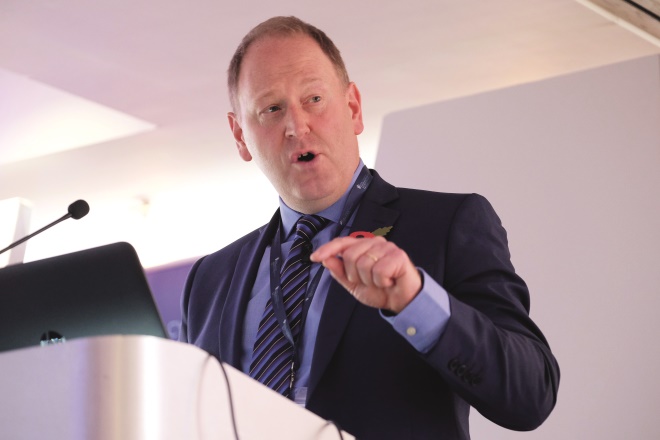
Source: Nick Treharne
Berwyn Owen, clinical director for pharmacy and medicines management at Betsi Cadwaladr University Health Board highlighted that success is equal to performance minus expectation
Keir Lewis, a professor of respiratory medicine at Swansea University, highlighted that Wales has the highest percentage of people in Great Britain being treated for asthma. Lewis talked about breaking the cycle of hospital admissions in relation to respiratory conditions such as asthma and chronic obstructive pulmonary disease and the huge role smoking cessation plays in improving the prognosis for patients with respiratory conditions. He spoke about the success of encouraging smoking cessation in the community highlighting that increased counselling has been shown to help increase the chance of an individual quitting smoking.
“Less than three minutes of any health professional’s time and your odds ratio goes up to 1.3, so 30% more people are going to quit after just three minutes of talking to someone.” The Tobacco Control Action Plan in Wales aims to drive down adult smoking prevalence to 20% in 2016 and to 16% in 2020. “Denormalising smoking is something that’s working, it’s not normal to smoke” he said.
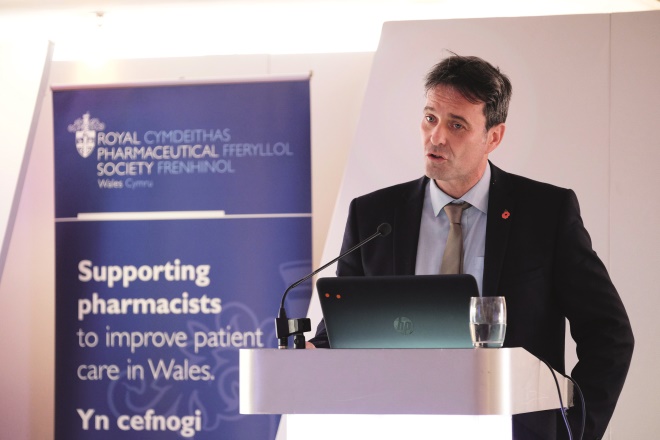
Source: Nick Treharne
Wales has the highest percentage of people in Great Britain being treated for asthma, according to Keir Lewis, a professor of respiratory medicine at Swansea University
Adam Roberts, head of economics at the Health Foundation, talked about the recent report released by the Health Foundation ‘The path to sustainability’ and what the funding projections are for the NHS in Wales in the future. He explained that the three main drivers of funding pressures in the NHS are the growing ageing population, the rise of chronic conditions and issues with staff pay.
“Within the report, we made the assumption that health spending is likely to grow broadly in line with what we’re seeing in England; if that was the case, by 2020 we’d be looking at a funding gap of about £700m that would need to be closed in order to protect the range and quality of services for patients.”
He went on to explain that although there is “nothing unsustainable about the current NHS model”, in order to close the gap, ongoing efficiency savings and improvements in the services provided are needed, particularly in social care where pressures are projected to rise at a faster rate than funding.
“There are real challenges within the NHS but the social care system needs immediate attention,” he said.

